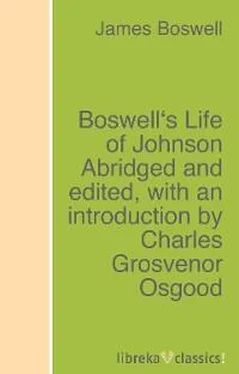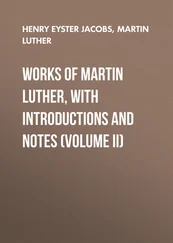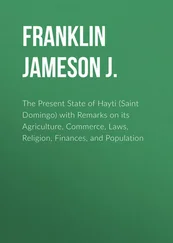James Boswell - Boswell's Life of Johnson Abridged and edited, with an introduction by Charles Grosvenor Osgood
Здесь есть возможность читать онлайн «James Boswell - Boswell's Life of Johnson Abridged and edited, with an introduction by Charles Grosvenor Osgood» — ознакомительный отрывок электронной книги совершенно бесплатно, а после прочтения отрывка купить полную версию. В некоторых случаях можно слушать аудио, скачать через торрент в формате fb2 и присутствует краткое содержание. Жанр: unrecognised, на английском языке. Описание произведения, (предисловие) а так же отзывы посетителей доступны на портале библиотеки ЛибКат.
- Название:Boswell's Life of Johnson Abridged and edited, with an introduction by Charles Grosvenor Osgood
- Автор:
- Жанр:
- Год:неизвестен
- ISBN:нет данных
- Рейтинг книги:4 / 5. Голосов: 1
-
Избранное:Добавить в избранное
- Отзывы:
-
Ваша оценка:
- 80
- 1
- 2
- 3
- 4
- 5
Boswell's Life of Johnson Abridged and edited, with an introduction by Charles Grosvenor Osgood: краткое содержание, описание и аннотация
Предлагаем к чтению аннотацию, описание, краткое содержание или предисловие (зависит от того, что написал сам автор книги «Boswell's Life of Johnson Abridged and edited, with an introduction by Charles Grosvenor Osgood»). Если вы не нашли необходимую информацию о книге — напишите в комментариях, мы постараемся отыскать её.
Boswell's Life of Johnson Abridged and edited, with an introduction by Charles Grosvenor Osgood — читать онлайн ознакомительный отрывок
Ниже представлен текст книги, разбитый по страницам. Система сохранения места последней прочитанной страницы, позволяет с удобством читать онлайн бесплатно книгу «Boswell's Life of Johnson Abridged and edited, with an introduction by Charles Grosvenor Osgood», без необходимости каждый раз заново искать на чём Вы остановились. Поставьте закладку, и сможете в любой момент перейти на страницу, на которой закончили чтение.
Интервал:
Закладка:
He thus discriminated, to Dr. Percy, Bishop of Dromore, his progress at his two grammar-schools. 'At one, I learnt much in the school, but little from the master; in the other, I learnt much from the master, but little in the school.'
He remained at Stourbridge little more than a year, and then returned home, where he may be said to have loitered, for two years, in a state very unworthy his uncommon abilities. He had already given several proofs of his poetical genius, both in his school-exercises and in other occasional compositions.
He had no settled plan of life, nor looked forward at all, but merely lived from day to day. Yet he read a great deal in a desultory manner, without any scheme of study, as chance threw books in his way, and inclination directed him through them. He used to mention one curious instance of his casual reading, when but a boy. Having imagined that his brother had hid some apples behind a large folio upon an upper shelf in his father's shop, he climbed up to search for them. There were no apples; but the large folio proved to be Petrarch, whom he had seen mentioned in some preface, as one of the restorers of learning. His curiosity having been thus excited, he sat down with avidity, and read a great part of the book. What he read during these two years he told me, was not works of mere amusement, 'not voyages and travels, but all literature, Sir, all ancient writers, all manly: though but little Greek, only some of Anacreon and Hesiod; but in this irregular manner (added he) I had looked into a great many books, which were not commonly known at the Universities, where they seldom read any books but what are put into their hands by their tutors; so that when I came to Oxford, Dr. Adams, now master of Pembroke College, told me I was the best qualified for the University that he had ever known come there.'
That a man in Mr. Michael Johnson's circumstances should think of sending his son to the expensive University of Oxford, at his own charge, seems very improbable. The subject was too delicate to question Johnson upon. But I have been assured by Dr. Taylor that the scheme never would have taken place had not a gentleman of Shropshire, one of his schoolfellows, spontaneously undertaken to support him at Oxford, in the character of his companion; though, in fact, he never received any assistance whatever from that gentleman.
He, however, went to Oxford, and was entered a Commoner of Pembroke College on the 31st of October, 1728, being then in his nineteenth year.
The Reverend Dr. Adams, who afterwards presided over Pembroke College with universal esteem, told me he was present, and gave me some account of what passed on the night of Johnson's arrival at Oxford. On that evening, his father, who had anxiously accompanied him, found means to have him introduced to Mr. Jorden, who was to be his tutor.
His father seemed very full of the merits of his son, and told the company he was a good scholar, and a poet, and wrote Latin verses. His figure and manner appeared strange to them; but he behaved modestly, and sat silent, till upon something which occurred in the course of conversation, he suddenly struck in and quoted Macrobius; and thus he gave the first impression of that more extensive reading in which he had indulged himself.
His tutor, Mr. Jorden, fellow of Pembroke, was not, it seems, a man of such abilities as we should conceive requisite for the instructor of Samuel Johnson, who gave me the following account of him. 'He was a very worthy man, but a heavy man, and I did not profit much by his instructions. Indeed, I did not attend him much. The first day after I came to college I waited upon him, and then staid away four. On the sixth, Mr. Jorden asked me why I had not attended. I answered I had been sliding in Christ-Church meadow. And this I said with as much nonchalance as I am now talking to you. I had no notion that I was wrong or irreverent to my tutor. BOSWELL: 'That, Sir, was great fortitude of mind.' JOHNSON: 'No, Sir; stark insensibility.'
He had a love and respect for Jorden, not for his literature, but for his worth. 'Whenever (said he) a young man becomes Jorden's pupil, he becomes his son.'
Having given a specimen of his poetical powers, he was asked by Mr. Jorden, to translate Pope's Messiah into Latin verse, as a Christmas exercise. He performed it with uncommon rapidity, and in so masterly a manner, that he obtained great applause from it, which ever after kept him high in the estimation of his College, and, indeed, of all the University.
It is said, that Mr. Pope expressed himself concerning it in terms of strong approbation. Dr. Taylor told me, that it was first printed for old Mr. Johnson, without the knowledge of his son, who was very angry when he heard of it.
The 'morbid melancholy,' which was lurking in his constitution, and to which we may ascribe those particularities, and that aversion to regular life, which, at a very early period, marked his character, gathered such strength in his twentieth year, as to afflict him in a dreadful manner. While he was at Lichfield, in the college vacation of the year 1729, he felt himself overwhelmed with an horrible hypochondria, with perpetual irritation, fretfulness, and impatience; and with a dejection, gloom, and despair, which made existence misery. From this dismal malady he never afterwards was perfectly relieved; and all his labours, and all his enjoyments, were but temporary interruptions of its baleful influence. He told Mr. Paradise that he was sometimes so languid and inefficient, that he could not distinguish the hour upon the town-clock.
Johnson, upon the first violent attack of this disorder, strove to overcome it by forcible exertions. He frequently walked to Birmingham and back again, and tried many other expedients, but all in vain. His expression concerning it to me was 'I did not then know how to manage it.' His distress became so intolerable, that he applied to Dr. Swinfen, physician in Lichfield, his god-father, and put into his hands a state of his case, written in Latin. Dr. Swinfen was so much struck with the extraordinary acuteness, research, and eloquence of this paper, that in his zeal for his godson he shewed it to several people. His daughter, Mrs. Desmoulins, who was many years humanely supported in Dr. Johnson's house in London, told me, that upon his discovering that Dr. Swinfen had communicated his case, he was so much offended, that he was never afterwards fully reconciled to him. He indeed had good reason to be offended; for though Dr. Swinfen's motive was good, he inconsiderately betrayed a matter deeply interesting and of great delicacy, which had been entrusted to him in confidence; and exposed a complaint of his young friend and patient, which, in the superficial opinion of the generality of mankind, is attended with contempt and disgrace.
To Johnson, whose supreme enjoyment was the exercise of his reason, the disturbance or obscuration of that faculty was the evil most to be dreaded. Insanity, therefore, was the object of his most dismal apprehension; and he fancied himself seized by it, or approaching to it, at the very time when he was giving proofs of a more than ordinary soundness and vigour of judgement. That his own diseased imagination should have so far deceived him, is strange; but it is stranger still that some of his friends should have given credit to his groundless opinion, when they had such undoubted proofs that it was totally fallacious; though it is by no means surprising that those who wish to depreciate him, should, since his death, have laid hold of this circumstance, and insisted upon it with very unfair aggravation.
The history of his mind as to religion is an important article. I have mentioned the early impressions made upon his tender imagination by his mother, who continued her pious care with assiduity, but, in his opinion, not with judgement. 'Sunday (said he) was a heavy day to me when I was a boy. My mother confined me on that day, and made me read "The Whole Duty of Man," from a great part of which I could derive no instruction. When, for instance, I had read the chapter on theft, which from my infancy I had been taught was wrong, I was no more convinced that theft was wrong than before; so there was no accession of knowledge. A boy should be introduced to such books, by having his attention directed to the arrangement, to the style, and other excellencies of composition; that the mind being thus engaged by an amusing variety of objects, may not grow weary.'
Читать дальшеИнтервал:
Закладка:
Похожие книги на «Boswell's Life of Johnson Abridged and edited, with an introduction by Charles Grosvenor Osgood»
Представляем Вашему вниманию похожие книги на «Boswell's Life of Johnson Abridged and edited, with an introduction by Charles Grosvenor Osgood» списком для выбора. Мы отобрали схожую по названию и смыслу литературу в надежде предоставить читателям больше вариантов отыскать новые, интересные, ещё непрочитанные произведения.
Обсуждение, отзывы о книге «Boswell's Life of Johnson Abridged and edited, with an introduction by Charles Grosvenor Osgood» и просто собственные мнения читателей. Оставьте ваши комментарии, напишите, что Вы думаете о произведении, его смысле или главных героях. Укажите что конкретно понравилось, а что нет, и почему Вы так считаете.












